Self-education is a focused work of a teacher to expand and deepen his theoretical knowledge, improve existing and acquire new professional skills in the light of modern requirements pedagogical and psychological sciences. During the school year or another period of time, the teacher should study in depth the problem, the solution of which causes certain difficulties or which is the subject of his special interest.
One type of gaming activity is a didactic game. This material is devoted to the problem: "the impact of the didactic game on the pedagogical process in the DOE"
This problem is relevant, since the game for preschoolers is a way of knowing the environment. She occupies a special place in the life of a child. In a didactic game, conditions are created in which each child gets the opportunity to act independently in a certain situation and with certain objects, gaining his own sensitive experience.
View Document Content
"Plan for self-education"
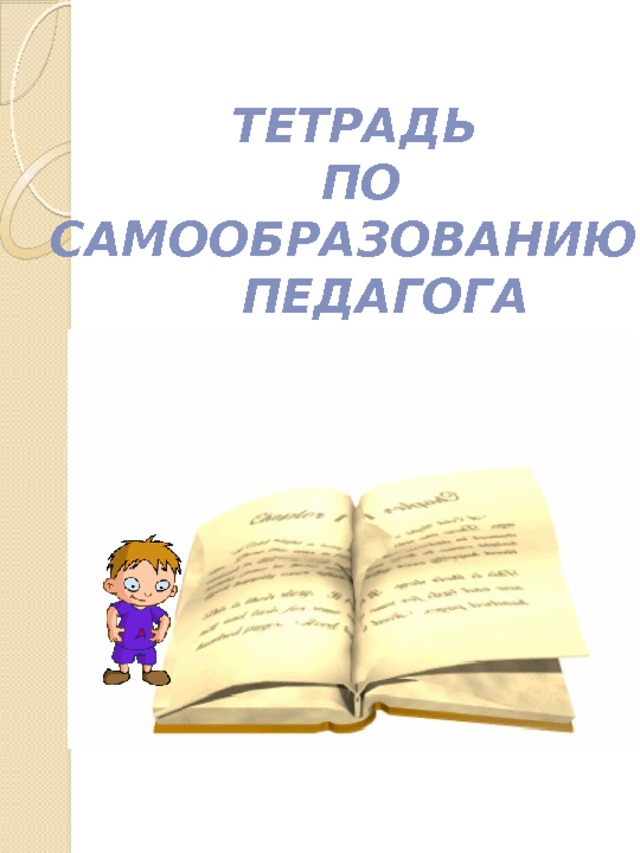
NOTEBOOK BY
SELF-EDUCATION
TEACHER
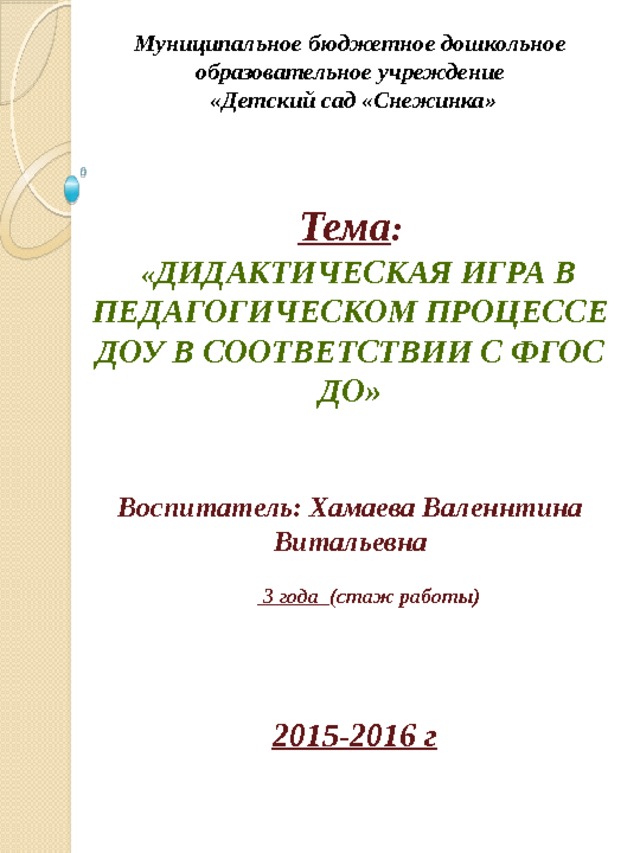
Municipal Budget Preschool educational institution
"Kindergarten" Snowflake "
Subject :
« Didactic game in pedagogical dOE process In accordance with Fgos to
Teacher: Khamaeva Valenntina Vitalievna
3 years (work experience)
2015-2016
Topic: “Didactic game in the pedagogical process of preschool educational institutions in accordance with the Federal State Educational Standards of Higher Education”
Relevance: A game for preschoolers is a way of knowing the environment. She occupies a special place in the life of a child. In a didactic game, conditions are created in which each child gets the opportunity to act independently in a certain situation and with certain objects, gaining his own sensitive experience.
While playing, the child studies the colors, form, properties of the material, spatial relationships, numerical relationships, studies plants, animals. ” One type of gaming activity is a didactic game. In this regard, I was interested in the problem: the impact of the didactic game on the pedagogical process in the DOE
Purpose: professional development in the issue "Didactic game in the pedagogical process in accordance with GEF"
Tasks:
- To analyze the psychological and pedagogical on this issue.
- To study the effectiveness of the use of didactic games in the pedagogical process.
- Develop a file of didactic games for children early age
- Create a corner of didactic games
Dates: academic year 2015–2016
Practical way out : creative report (presentation)
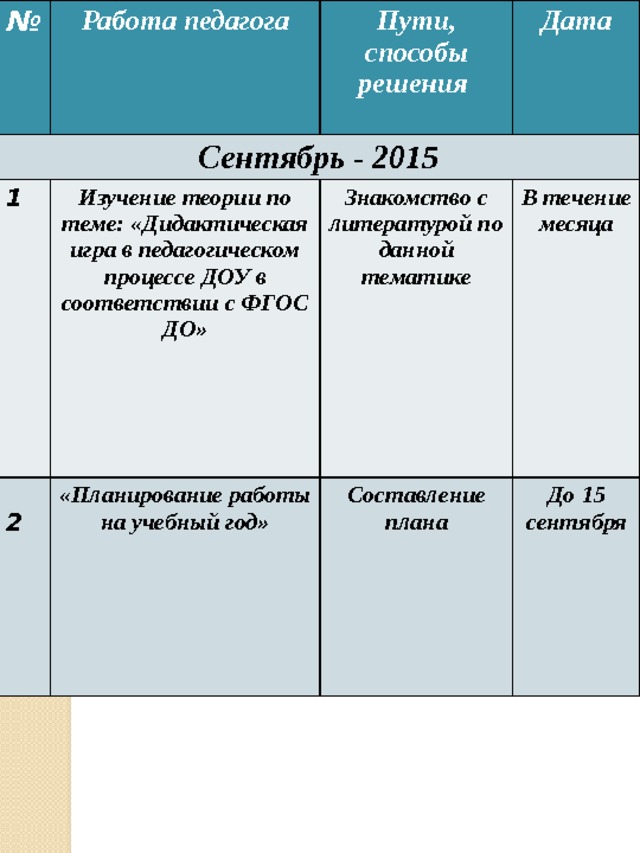
№
Teacher's work
September 2015
Ways, solutions
1
date
The study of the theory on the topic: "Didactic game in the pedagogical process of preschool education in accordance with the Federal State Educational Standard
"Planning for academic year»
Acquaintance with literature on the subject
2
Planning
Within a month
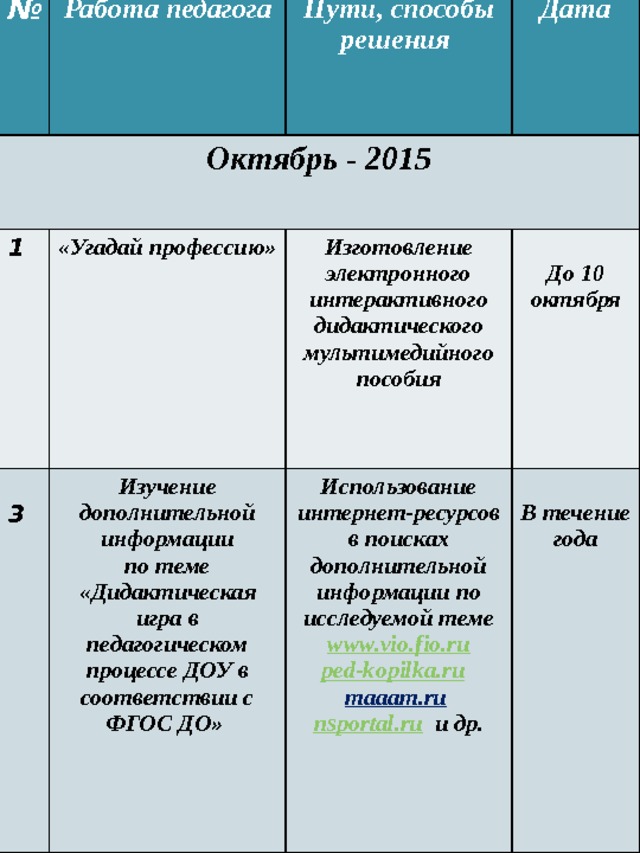
№
October 2015
Teacher's work
1
Ways, solutions
date
“Guess the profession”
Production of electronic interactive didactic multimedia manual
Study of additional information
3
The use of Internet resources in search of additional information on the topic under study
on the topic "Didactic game in the pedagogical process of DOE in accordance with the Federal State Educational Standard"
www.vio.fio.ru
ped-kopilka.ru
During a year
maaam.ru
nsportal.ru and etc.
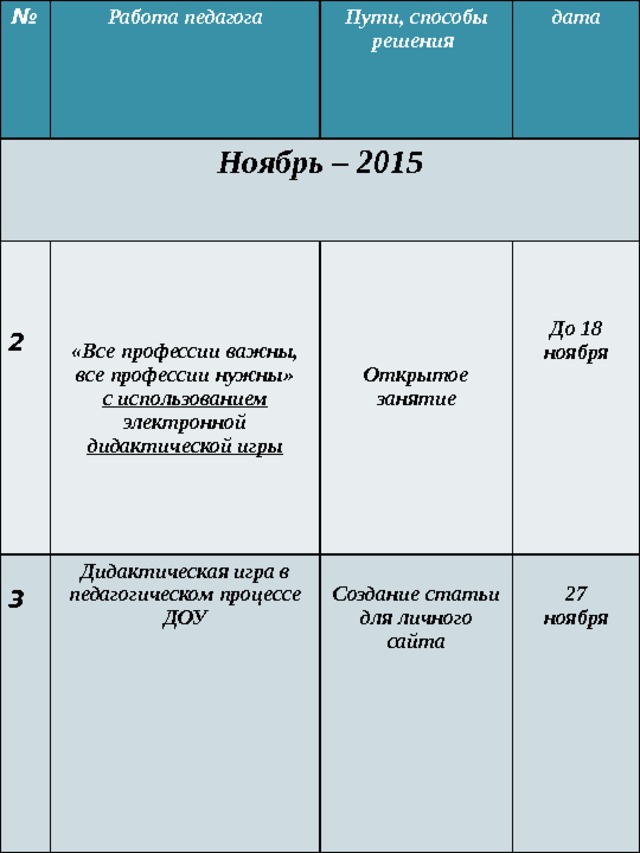
№
Teacher's work
November 2015
Ways, solutions
“All professions are important, all professions are needed”
date
Didactic game in the pedagogical process of preschool educational institution
using e didactic game
Open lesson
3
2
Creating an article for a personal site
27
Before 18
november
november
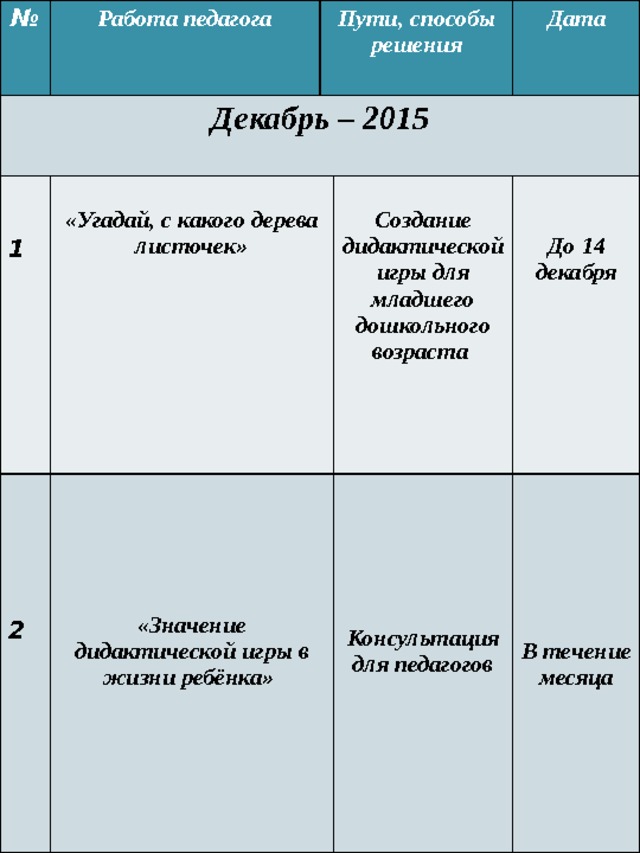
№
Teacher's work
December 2015
Ways, solutions
1
date
“The value of didactic games in the life of a child”
“Guess what leaf the tree is from”
Consultation
for educators
2
Within a month
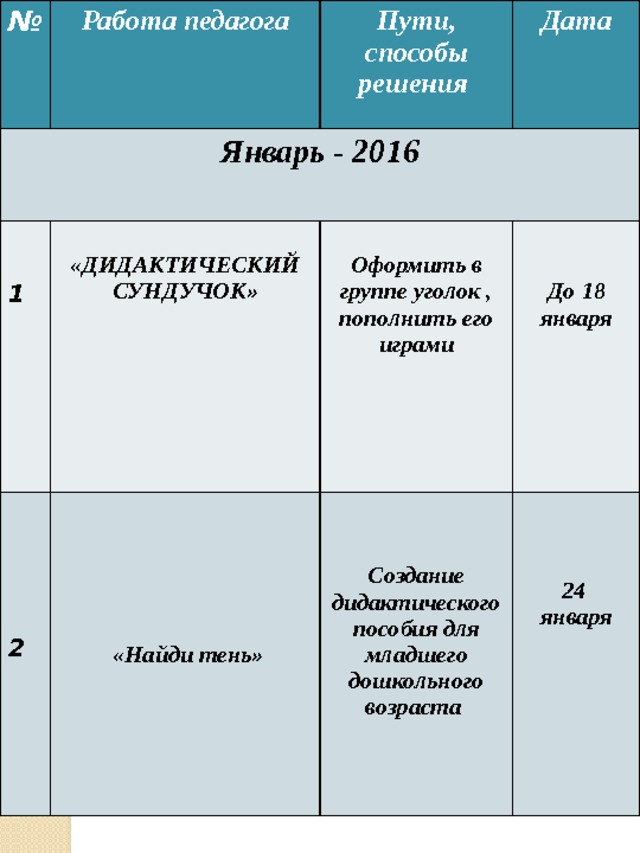
№
Teacher's work
January 2016
Ways, solutions
date
Find the Shadow
"DIDACTIC CHEST"
1
Make a corner in the group, replenish it with games
Creating didactic
benefits for the younger preschool age
Before 18
january
2
24
january
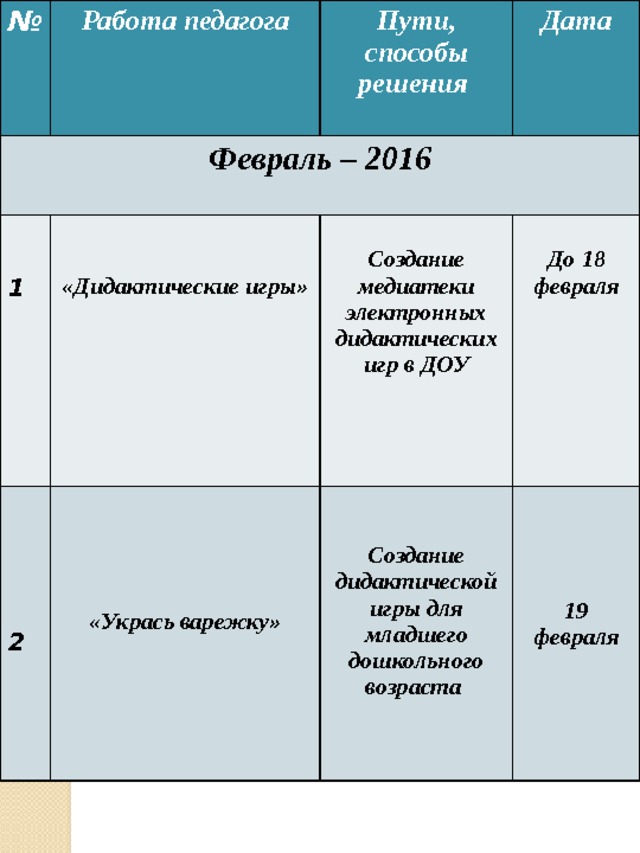
№
Teacher's work
February 2016
Ways, solutions
date
“Decorate the mittens”
1
Creation of a library of electronic didactic games in a preschool educational institution
Creating a didactic game for preschool children
Before 18
february
2
19
february
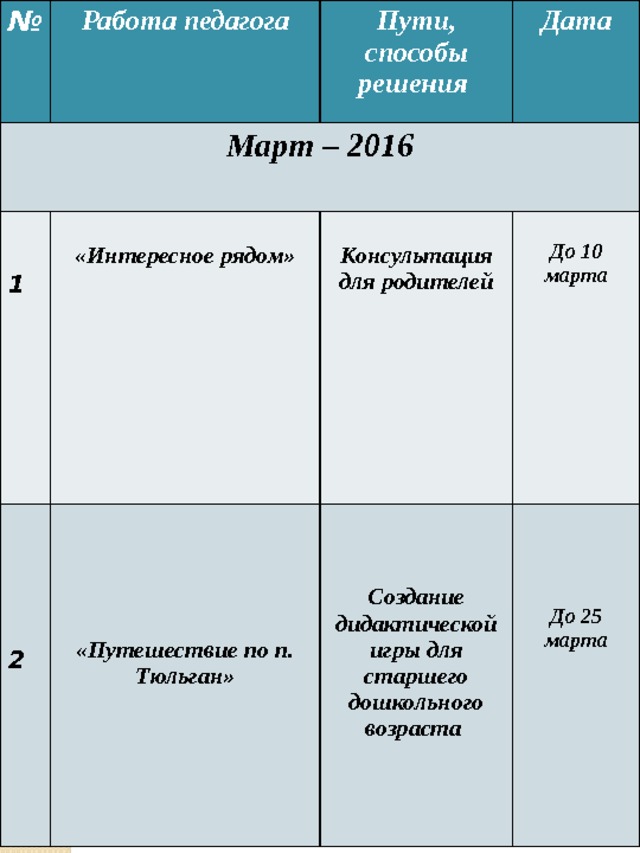
№
Teacher's work
March 2016
Ways, solutions
date
1
“Interesting is nearby”
"Journey to the village of Tulgan"
Creating a didactic game for older preschool children
Consultation for parents
2
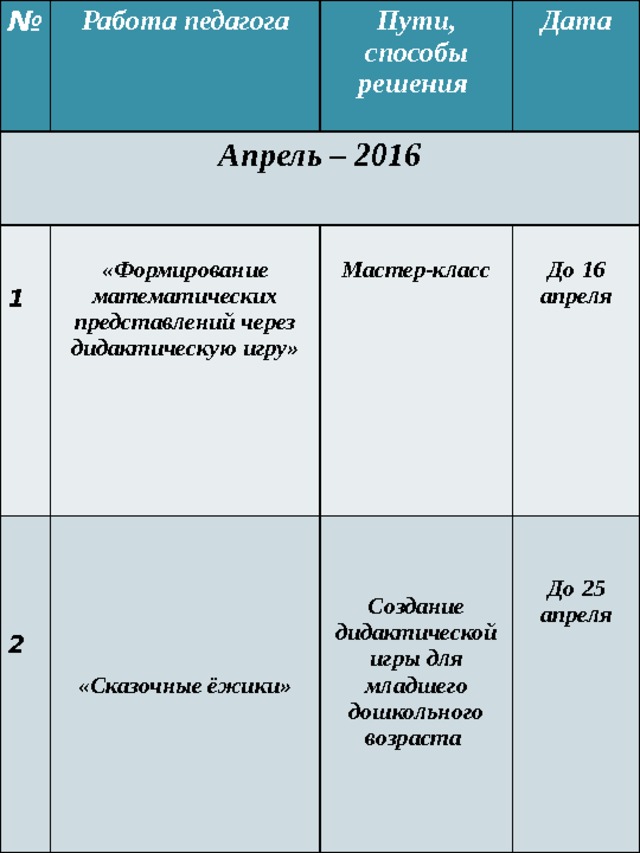
№
Teacher's work
April 2016
Ways, solutions
date
"Fairy Hedgehogs"
1
“Formation of mathematical representations through a didactic game”
Creating a didactic game for preschool children
Master Class
Up to 16
april
2
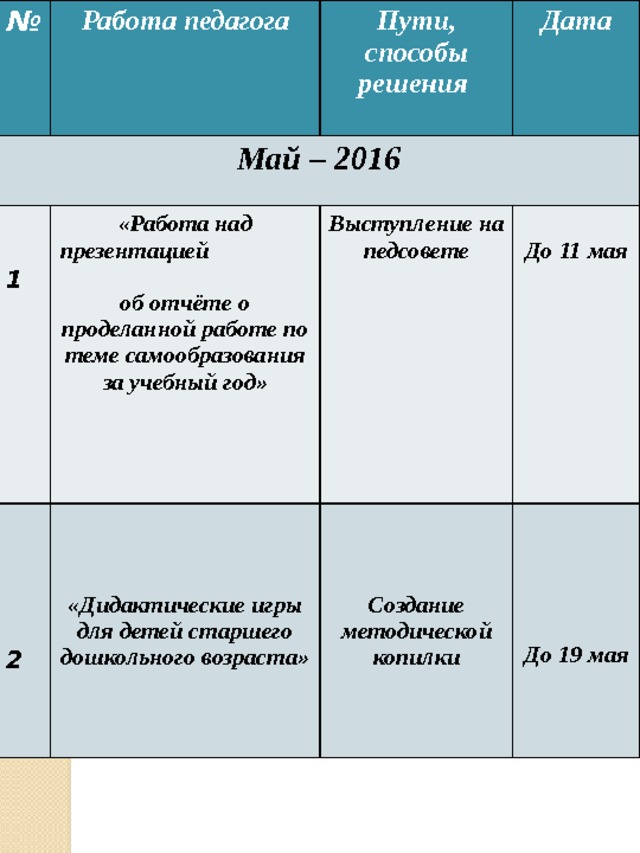
№
Teacher's work
May 2016
Ways, solutions
date
“Work on the presentation of the progress report on the topic of self-education for the academic year”
Speech at the teacher's council
1
"Didactic games for children of preschool age"
Creating a methodological piggy bank
2
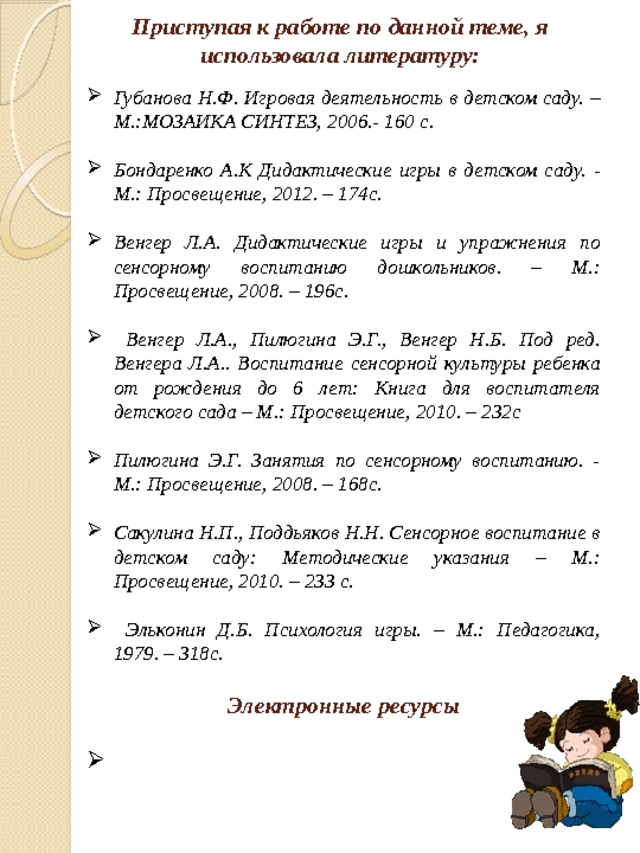
Starting to work on this topic, I used the literature: .
- Gubanova N.F. Game activities in kindergarten. - M.: MOSAIC SYNTHESIS, 2006.- 160 p.
- Bondarenko A.K. Didactic games in kindergarten. - M .: Education, 2012 .-- 174 p.
- Wenger L.A. Didactic games and exercises for sensory education of preschool children. - M.: Education, 2008 .-- 196p.
- Wenger L.A., Pilyugina E.G., Wenger N.B. Ed. Vengera L.A. Education of sensory culture of a child from birth to 6 years: a book for the educator kindergarten - M.: Education, 2010 .-- 232s
- Pilyugina E.G. Sensory education classes. - M .: Education, 2008 .-- 168s.
- Sakulina N.P., Poddyakov N.N. Sensory education in kindergarten: Guidelines - M .: Education, 2010. - 233 p.
- Elkonin D.B. The psychology of the game. - M.: Pedagogy, 1979.- 318s.
Electronic resources
The teacher’s self-education plan on the topic: “The system of the teacher’s work in preschool education, in the formation of road safety skills and the prevention of road accidents involving children” for the 2015-2016 academic year
The baby got to his feet - he is already a pedestrian.The child got on the bike - he is already a driver.
I went on the bus - he is already a passenger.
And everywhere he is in danger.
Relevance:
The problem of human safety in traffic arose with the advent of the wheel and the creation of vehicles for transporting people and goods. The relationship between vehicle drivers and pedestrians was always controlled by the state, which ensured their safety. As early as 1720, the decree of Peter 1 was issued, related to the rules of the road. The most stringent order on the roads in Russia was under Catherine 2. In 1764 she issued a decree on the application of the death penalty to a coachman or cabman, guilty of the death of a child.
In modern conditions, due to the rapid development of the automotive industry, the number of accidents and accidents with people (especially with children) on the roads has increased. Therefore, the problem of safe road behavior has become relevant in our country. The urgency of the problem is due to the fact that in preschool children there is no protective psychological reaction to the road situation, which is not characteristic of even all adults. The child is interested in the street and everything that happens on it. And often, carried away by something new, unusual, a child gets into dangerous situations for his life on the street.
Today, the issue of child safety is being actively discussed in society and employees of childcare institutions are especially worried about minors, who, by the nature of their activities, are responsible for their children.
Exactly at younger age the foundation of life orientations in the surrounding world is laid, and everything that a child learns in kindergarten will remain with him forever. That is why from a very early age it is necessary to teach children safe behavior on the streets, roads, in transport and traffic rules. Both parents and preschool institutions should take part in this, and later, of course, the school and other educational institutions
This problem seems so urgent that it served as the basis for choosing this topic, the topic of self-education.
Subject: “The system of the teacher’s work in the preschool educational institution in the formation of road safety skills and the prevention of road accidents involving children.”
Purpose:
Improving your professional skills and competence.
Improving the conditions for the formation of sustainable safety skills in preschool children in the surrounding road transport environment.
Work on a professional self-education program will help me solve the following problems:
Tasks:
The adoption by preschoolers of initial knowledge about the rules of safe behavior on the street;
To form and develop in children a holistic perception of the surrounding road environment.
Expand the vocabulary of children in road vocabulary
Intensify interaction with parents on the promotion of traffic rules and child safety
Develop logical thinking, voluntary attention, visual and auditory perceptioncreative activity;
To unite the children's team.
To foster discipline and conscious implementation of traffic rules, a culture of behavior in the road transport process.
As a result of the work, it is supposed:
what children learn about the main sources and types of danger on the street;
about life-threatening situations and ways to prevent dangerous situations on the street;
children will be careful and prudent in a potentially dangerous situation (on the carriageway, when crossing streets, intersections, when moving in a car);
will require others (children and adults) to comply with the rules of safe behavior in standard and non-standard hazardous situations;
will be guided in vehicles your area, know the basic rules of behavior on the street and in public transport;
understand the meaning of generally accepted symbolic signs (road signs, road markings, traffic lights, bus stops, etc.);
the use of didactic games and exercises will contribute to the full development of the child.
Form of self-education: individual
FORMS OF WORK:
1. Acquaintance with fiction.
2. Excursions, observations, walks.
3. GCD.
4. Entertainment and leisure.
5. Games: board, didactic, construction, theatrical, mobile.
6. Work with parents, consultations, discussions, questionnaires.
7. Work with children: joint games, individual work, the introduction of gaming techniques.
8.Manufacture folders folders
9. Monitoring.
EXPECTED RESULTS:
1. Enhancing children's perceptions of the environment and traffic rules.
2. The skills of calm, confident, cultural and safe behavior in the road transport environment.
3. The ability of children to anticipate dangerous situations and circumvent them.
4. Increasing the activity of parents and children to ensure road safety.
Work with children
September
Planning individual work in the form of an exciting and informative activity.
Selection of methodological literature
Interaction with the teaching staff
Preparation and holding a consultation. October
Joint with / r games to consolidate the skills of safe behavior on the road.
Production of attributes for agricultural games
Developing forward-looking safety planning.
Development of a project for traffic rules
NovemberProduction of the model "Our Street" Conversation: "Our village and its transport."
Production of road signs, models of houses.
Interaction with parents: Questioning parents.
December
Joint didactic games to consolidate the rules of the road.
Selection of didactic games.
Processing personal data.
Work with parents.
January
Beating situations on the road; Conversation: “Caution, slippery road! "
Interaction with parents: selection of visual-informational and advisory material.
February
Children's research projects on traffic rules
Selection of topics for projects; Children's research projects: “When and why did traffic rules appear? "," Who is the traffic controller? "," Zebra "," History of the traffic light ", etc.
Interaction with the teaching staff: preparation for the master class.
March
View presentations "Road Signs", "Our Street" Selection of material for presentations April Reading poems, stories, guessing riddles according to traffic rules; Selection of methodological literature.
April.
Children's research projects on traffic rules.
Selection of pictures of traffic situations.
May
The ABC of Security Project, Joint Didactic, desktop-printed, s / r games on traffic rules. Selection of games-classes.
Work with parents
SeptemberPrivate conversations with parents on the topic: “Is it easy to teach a child to behave properly on the road? »Selection of methodological literature on the topic.
October
Joint production of attributes to c / r, didactic games Selection and manufacture of gaming equipment
November
Consultations: “Child safety in the car”, “Mom driving: safety basics”. The design of the folder-moving on the topic
December
Making a photo album "Road Signs." Selection of methodological literature on the topic
January
Release of memos for parents Memos for parents: “How to teach a child the rules of safe behavior on the road”, “Causes of road traffic injuries”, “Rules of behavior at public transport stops”
February
Drawing up research projects with children
Children's research projects: “When and why did traffic rules appear? "," Who is the traffic controller? "," Zebra "," History of the traffic light "," History of the development of the automotive industry. "
March
Joint replenishment with parents of didactic games on traffic rules, attributes for agricultural games. Study of methodological literature on the topic, production of attributes
April
Individual and collective consultations and discussions: “Child safety is adult care! ". The design of the folder-movements on the topic:
May
Project: "The ABC of security"; joint preparation for the summer wellness season. Presentation of the ABC of security project, selection of gaming equipment.
Self-realization
September - May
Circle "Caring Parents"; The ABC of Safety project, final event: entertainment “We learned the life safety rules, we became children brought up”; Game-KVN “Attentive pedestrian”. Holding games - classes. Planning didactic games and exercises daily outside of classes.
The study of methodological literature on this topic. Selection of lecture notes.
September
N.V. Elzhova SDA in d / s: developing environment and methodology for familiarizing children with traffic rules, forward planning, class notes. Rostov N / A, 2013.
October
T. A. Igorygina Conversations on the rules of the road with children 5-8 years old. -M. : SC Sphere, 2013.
November
E. I. Shalamova Rules and road safety. - M.: Publishing house "Scriptorium 2013", 2013.
December
Internet services
January
Studying articles in magazines: Preschool education, Child in kindergarten, Kindergarten teacher.
February
O. Yu. Startseva School of Road Sciences: Dokolnikam on the rules of the road, 2012.
March
T.F. Saulina Three traffic signals. From work experience preschool institutions. Did. games, scenarios of entertainment evenings, literary material. –M. Education. 2008.
April
G. D. Belyaevskova. Traffic rules for children 3-7 years old: classes, targeted walks, matinees, excursions. Volgograd, 2012.
May
N. A. Izvekova Classes on the rules of the road. M.: shopping center. Scope 2011.
Forms of presentation of the results of self-education.
Consultation for educators on the formation in children of preschool age of safe behavior skills on traffic rules.
Master class for teachers of DOW.
Counseling for parents.
A project to familiarize students with traffic rules.
Participation in the contest "Green Light".
Exchange of experience over the Internet.
The hypothesis consists in the assumption that positive effectiveness in older preschool children in the formation of safe street behavior skills can be achieved if different types activities (independent, joint, directly educational) safety information will be included. In kindergarten, a week on road safety in senior group.
Children took an active part in various events. Together with the teachers, they examined the plot pictures, played with road models at the intersection, examined the thematic albums “Types of Transport”, “Road Signs”, conducted a series of targeted walks “Traffic Light”, “Pedestrian Crossing”, played the role-playing role-playing “Road Traffic”, watched videos
In the group, the boys took part in theatricalization: "Cross the road correctly." We beat the story of a naughty cat who violated the rule of the road. The performance was watched by children of all groups.
And they finished the week according to the SDA with the words "and may all people be alive, healthy and happy."
I believe that this area of \u200b\u200bwork should always be in the field of close attention of teachers, which means that a further search for new effective forms work on the prevention of childhood road traffic injuries.
Work plan for self-education teacher DOE
Author: Ivanova Victoria Olegovna; educator, Municipal preschool educational institution "Kindergarten of combined type No. 156", Saratov
Work description: I suggest that you familiarize yourself with my first individual teacher’s self-education plan on the subject: “Unlocking the creative potential of a child’s personality through its individualization”.
This material will be useful. teachers and educators DOE.
I would be grateful for constructive criticism, since the work is being done by me for the first time.
Individual plan of self-education 2016-2017 academic year
Position: educator
FULL NAME: Ivanova Victoria Olegovna
Education: higher, SSTU named after Gagarin Yu.A., specialty - Psychologist. Psychology teacher
Professional retraining courses: “Educator (Pedagogy and Psychology. Educational work) ”, The training period is 3.5 months (504 hours)
Training period: December 2016 - March 2017
Individual theme: The disclosure of the creative potential of the child’s personality through its individualization.
When did you start work on the topic:December 2016
When is it planned to finish work on the topic:November 2017
The purpose of self-education on the topic: learn to create conditions for the individualization of educational relations, providing the possibility of social self-determination of the child, independence and initiative; improve your scientific, methodological, theoretical level and professional skills.
Tasks:
1. Increase your own level of knowledge by studying the necessary literature, attending various thematic seminars and webinars.
2. To study the psychological and age features preschoolers.
3. Study the document Federal State Educational Standard preschool education (Order of the Ministry of Education and Science dated 10.17.2013 No. 1155);
4. To formulate in children adequate ideas about the interconnections in the “man-world” system and in the world around him, based on universal principles;
5. Individualization of education of each child;
6. To stimulate the creative manifestation of oneself to the world and the knowledge of the world through creative ways of mastering the surrounding reality in specific types of children's activities;
7. Create conditions for the development of independence in the planning and implementation of their ideas by the child;
8. Timely identify, maintain and develop children's abilities, children's interests;
9. Develop preschooler activity in different kinds children's activities conditions of socialization and individualization of children;
10. Improving your own general cultural level.
11. Subject publications in the media
Key questions to be addressed:
- creative methods of working with preschoolers in various activities,
- integration of pedagogical and educational methods, their inclusion in the process of individualization,
- disclosure of the creative potential of the personality of each child,
- an individual-personal approach, as a promising area of \u200b\u200bmodern pedagogy and the educational process.
Stages of material development: diagnostic.
What is the expected result: raising one's own general cultural level, developing professional and pedagogical competence, improving work with children, and increasing professional skills.
Results submission form:
- speech (report) at a meeting of the methodological council, pedagogical council with the subsequent submission of the written text of the speech (report);
- publications in the media.
Appendix No. 1
SELF-EDUCATION WORK PLAN
Section 1. The study of methodological literature on the topic.
1. Azarov Yu.P. Mastery of the educator, Enlightenment, 1971.
2. Asmolov A.G. Psychology of individuality.-M.: Sense, 2001.-416s
3. Vygotsky L.S. “Education and development at preschool age // Kindergarten. Control. 2001. No. 1-3. p.2-3.
4. Makhaneva M.D. An individual approach to a child in a preschool educational institution: Organizational and methodological aspect.-M .: Shopping center Sfera, 2005.-57p .- (Library of the head of the preschool educational institution).
5. Fundamentals of pedagogical skill, ed. I.A. Zyazyuna. M., 1989.
6. Petrovsky V. A. "Educators and children: sources of growth." - M-, 1994.
7. Help me do it myself, M. Montessori. / Comp., Entry. article M.V. Boguslavsky, G. B. Kornetov. -M.: Publ. house "Peanut", 2000. - 272 s, ill. - (Pedagogy of childhood) Scientific editor S. V. Lykov
8. Svirskaya L.V. Individualization of education: the right start: an educational-methodical manual for employees of preschool educational institutions.-M.: Hoop, 2011.-240p.
Section 2. Methodological work on self-education.
1. View work forms educational activities at kindergarten level. (DECEMBER-MAY)
2. Participation in the competition of professional skill of teachers of preschool educational institution (kindergarten level). (FEBRUARY)
3. A message for teachers of the preschool educational institution on the topic: “Unlocking the creative potential of the personality of the child through his individualization” (MARCH)
Section 3. Work with children
1. Introspection of pedagogical activity. (SEPTEMBER-MAY)
2. Assistance in the preparation and holding of the holiday for the day of February 23 and March 8 (FEBRUARY-MARCH)
2. Assistance in the preparation and holding of the holiday "This Victory Day". (APRIL MAY)
3. Help in the preparation and conduct of intra-garden and group events.
Section 4. Work with parents.
1. Development of a plan of work with parents for a year. (JANUARY)
2. Participation in the preparation and conduct of the final parent meeting. (MAY)
Self education Is purposeful cognitive activitymanaged by the individual himself to acquire systemic knowledge in any field of science, technology, culture, political life, etc. S.I. Ozhegov defines self-education as "the acquisition of knowledge through independent study without the help of a teacher."
Self-education allows you to replenish and concretize your knowledge, to carry out a deep and detailed analysis of situations that arise in working with children. A teacher who has the skills of independent work, has the opportunity to prepare and move to a focused scientific and practical, research activities, which indicates a higher professional, educational level, and this, in turn, affects the quality of educational educational process and the effectiveness of educational activities.
An important condition for professionalism is a properly organized and ongoing work on self-education. This helps each teacher to plan their work, correct analysis activities, goal setting, choice of forms and methods. To this end, educators draw up various self-education plans. Below is experience in this area.
SELF-EDUCATION PLAN
1. Full name the teacher - Lifanova Tatyana Nikolaevna
2. Education - secondary special, 1 qualification category.
3. The topic of self-education: "Implementation of FSW in the educational process."
4. The work started on September 01, 2011.
5. It is supposed to finish on May 30, 2012.
6. Purpose: to study FGT to the structure of the basic general educational program of preschool education.
7. Tasks:
- to study and implement the program “From birth to school” in all educational areas (new edition in accordance with the Federal State budget)
- develop long-term plans for all educational areas
- to develop a model of the educational process that meets FGT
- test this model in practice
8. Estimated result: reassessment of pedagogical values, one's professional appointment; desire to improve the educational process.
9. Form of self-education: individual.
10. Actions and activities carried out in the process of work on the topic:
- study of literature on the topic
- visiting the NCD from the educators of their preschool educational institution and the district;
- attendance of teachers' councils, seminars, conferences;
- introspection and self-assessment of GCD in its group;
- development of a model of the educational process that meets FGT
- testing the developed model in practice. Making the necessary adjustments;
- conducting a series of open events for analysis by colleagues;
- generalization of results at a meeting of a methodological association.
11. Practical solution: workshop.
12. Report form on the work done: message to; presentation on the topic.
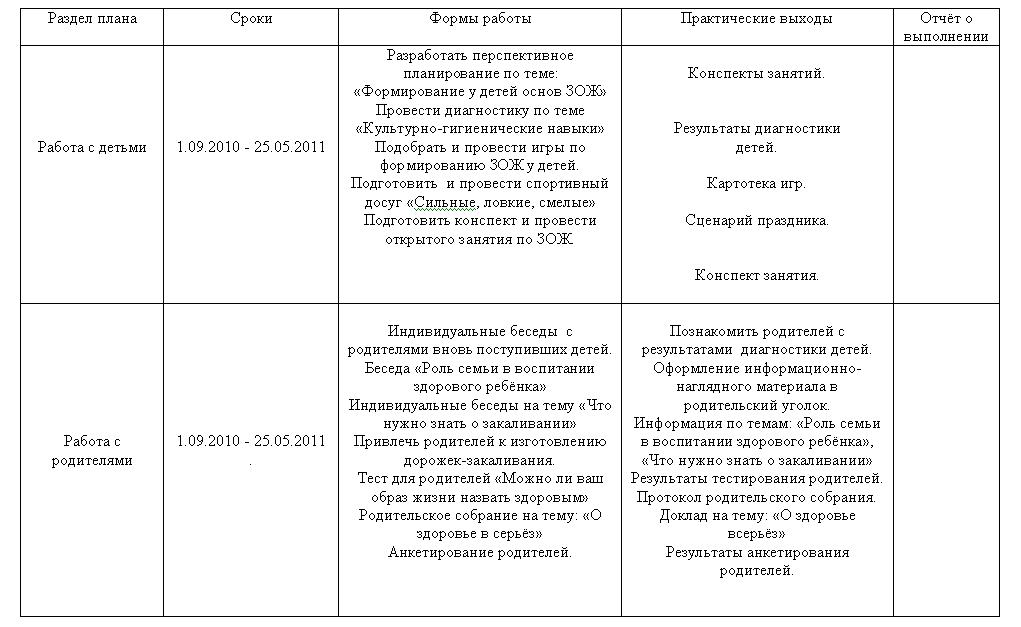
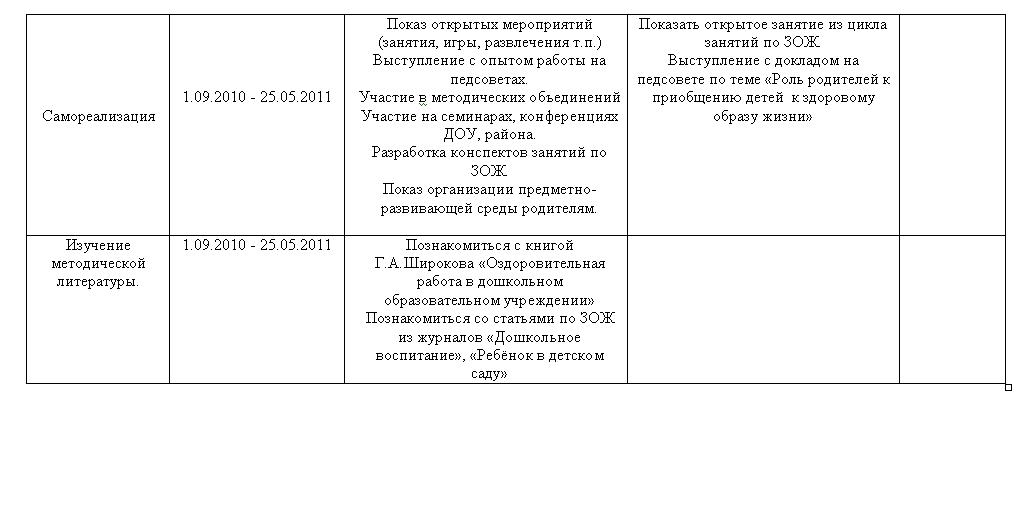
MBDOU-kindergarten "Firefly",
Saratov region, r.p. Bald mountains.
Showing publications 21-30 of 1142.
All sections | Self-education. Plans, self-education reports
Self-education. GBOU SCHOOL №152 THEME SELF-EDUCATION : “The use of health-saving technologies in working with preschool children” educator: Arapova Tatyana Vladislavovna Children's health is the future of the country. However, health does not exist in itself, given this, constantly ...
Self-education work plan “Introducing Preschoolers to the Origins of Popular Culture” (middle group) Self-education work plan"The introduction of preschoolers to the origins of folk culture" (middle group) September Events from children: Making a file cabinet (round dance games. Drawing: “Nesting dolls came to visit us”. Applique: “Delicious gifts of a generous autumn”. Modeling: “A treat for ...
Self-education. Plans, reports on self-education - Plan for self-education for the 2016-2017 academic year.
Publication "The plan for self-education for the 2016-2017 academic ..." Self-education plan for the 2016-2017 academic year. Subject: Cognitive-speech development of children. Month. Subject. Work content. Practical output. September. Selection and study of literature on the topic; didactic games and exercises; plot pictures; Memos for parents on learning coherent ...
Image Library "MAAM Pictures"
Self-education report “Theatrical activities in kindergarten” Report on self-education for the 2016-2017 academic year. Great attention I was attracted by the following topic: “Theatrical activities in kindergarten” In this, I believe that theatrical classes in a preschool educational institution can be of great help. They always delight children and enjoy their constant ...
Self-education plan for the 2016–2017 school year Topic: “Development of creative abilities, initiative, independence in preschool children through productive activities (application. Work started: November 2017; Expected to be completed: May 2017; Goal: Development of creative abilities in older children ...
Self-education plan “Development of search and research activities of preschoolers in the process of experimentation” Theme: "The development of search and research activities of preschoolers in the process of experimentation" Purpose: to create optimal conditions for development cognitive research abilities of preschool children as the basis of intellectual - personal, creative development; ...
Self-education. Self-education plans, reports - Perspective self-education plan “Didactic games in the development of attention and memory of children 3-4 years old”
Prospective plan professional self-education on the topic "Didactic games that promote the development of voluntary attention and arbitrary memory for young children." MBDOU "Kindergarten of combined type No. 120", Kursk. Educator: Gabieva Kristina Viktorovna ....
Self-education work plan “Theatrical activity as a means of socializing young children” The relevance of the topic of self-education. "The spiritual life of a child is full only when he lives in a world of fairy tales, creativity, imagination, fantasy, and without it he is a dried flower." V. Sukhomlinsky As you know, socialization is the assimilation of moral standards and values \u200b\u200bby a person ...
Self-education work plan “Familiarizing children with the origins of Russian folk culture” INDIVIDUAL WORK PLAN OF A TEACHER OVER THE TOPIC OF SELF-EDUCATION Topic: "Introduction of children to the origins of Russian folk culture." Start date for work on the topic: 2015. Estimated end date for work on the topic: 2016. Goal: Improve your professional skills, ...

Pinosol spray: instruction
Analgin tablets: instructions, reviews, analogues Terms and conditions of storage of Analgin
Ginipral - description of the drug, instructions for use, reviews
Topical solution tantum verde
Chophytol and side effects